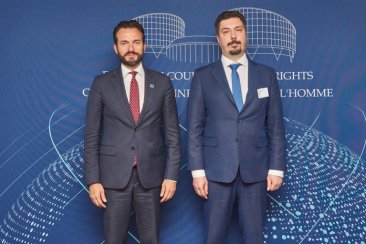Contact center of the Ukrainian Judiciary 044 207-35-46

The President of the Supreme Court Vsevolod Kniaziev is on a working visit to the city of Strasbourg at the invitation of the President of the European Court of Human Rights Robert Spano. The Ukrainian delegation included Iryna Hrihorieva, Judge of the Grand Chamber of the Supreme Court, and Lina Hubar, Head of the Division of International and Legal Cooperation.
The issues of protecting human rights during the war became the subject of the meeting of the court presidents Vsevolod Kniaziev and Robert Spano. The meeting was also attended by Ganna Yudkivska, Judge of the European Court of Human Rights in respect of Ukraine (2010-2022), Abel Campos, Deputy Registrar of the Court, and Viktor Nikitiuk, Deputy Permanent Representative of Ukraine to the Council of Europe.
Robert Spano said that the ECtHR was very concerned about the events taking place in Ukraine. He elaborated on how the Court dealt with Ukrainian cases filed after February 24, 2022. According to him, the work of the ECtHR in such a conflict is a huge challenge. And the very first of them is thousands of allegations of human rights violations in conflict-affected areas. The ECtHR has already seen something similar after 2014, when the Court began to receive massive applications of human rights violations in eastern Ukraine and Crimea.
“But there is one thing I want to make very clear is that we will not shy away from our work,” said Robert Spano. He added that many ECtHR cases had stated that the principles of the Convention should remain intact and Convention obligations should be fulfilled.
Vsevolod Kniaziev expressed his gratitude to the President of the ECtHR for the invitation and for the support that the Council of Europe and the ECtHR had provided and continued to provide. The President of the Supreme Court showed his special appreciation for the decision of the European Court of Human Rights in early March ordering the Russian Government to refrain from military attacks on the civilian population and civilian objects. "It is unfortunate that Russia has remained deaf to these calls," he said.
The SC President said that, as a result of the termination of the membership of the Russian Federation in the Council of Europe, Russia ceased to be a Contracting Party to the Convention for the Protection of Human Rights and Fundamental Freedoms since September 16, 2022. He warned that after September 16 Ukrainian citizens who would remain in the occupied territories would not be able to apply to the ECtHR for the protection.
Robert Spano, for his part, confirmed this fact. This is the consequence of Russia’s exclusion from the Council of Europe. Since September 16, 2022, all violations that Russia could theoretically commit in the territories over which it exercises effective control within the meaning of Art. 1 of the Convention will no longer be the subject of consideration in the ECtHR.
Vsevolod Kniaziev said that in 1950, when the Convention was signed, it was unlikely that it would have to be applied to legal relations during war. It is very saddening to him that the inhabitants of Ukraine in the occupied territories will be left without the protection of the European Court of Human Rights after September 16. He is convinced that this fact is a signal that the system of protection of rights in Europe must change.
The SC President also highlighted that the ECtHR was considering nine cases of Ukraine against Russia. One of the interstate cases is the Crimea case. He said that it would be a powerful message for the international community if open hearings on the case were held before September 16, 2022 and Ukraine had time to publicly express its arguments on Crimea. It would be important for the ECtHR to be able to decide on this case, as well as on the case of Ukraine and the Netherlands v. Russia, before the termination of the membership of the Russian Federation in the Council of Europe.
Vsevolod Kniaziev informed the participants of the meeting about the current state of the judiciary of Ukraine during the war. These are very difficult and dramatic times. He said that some of the courts were located in the temporarily occupied territories and therefore did not administer justice; some court facilities had been completely destroyed or severely damaged. Ukrainian cities, such as Kharkiv, are bombed daily by the occupiers.
The work of courts in the territories deoccupied from Russian troops is gradually being resumed. However, this process is significantly complicated by the considerable reduction in the judiciary budget.
The SC President said that some judges who heard cases against separatists or collaborators were in captivity - they were kept in the prisons of the occupied Luhansk and Donetsk regions. The inclusion of the names of these judges on the prisoner exchange lists and the exchange itself is a priority.
He also shared that at the moment many court cases were being postponed due to the fact that the participant in the case was abroad or did not communicate at all. Potentially, in the future, such cases may become the subject of consideration by the ECtHR in the context of Art. 6 of the Convention.
Concluding the meeting, Robert Spano said that he was grateful to the judges of Ukraine for their work in order for the judiciary to continue to protect human rights in the territories controlled by Ukraine. And everything that the ECtHR will do in such conditions at the procedural level should take into account the circumstances in which Ukraine finds itself.